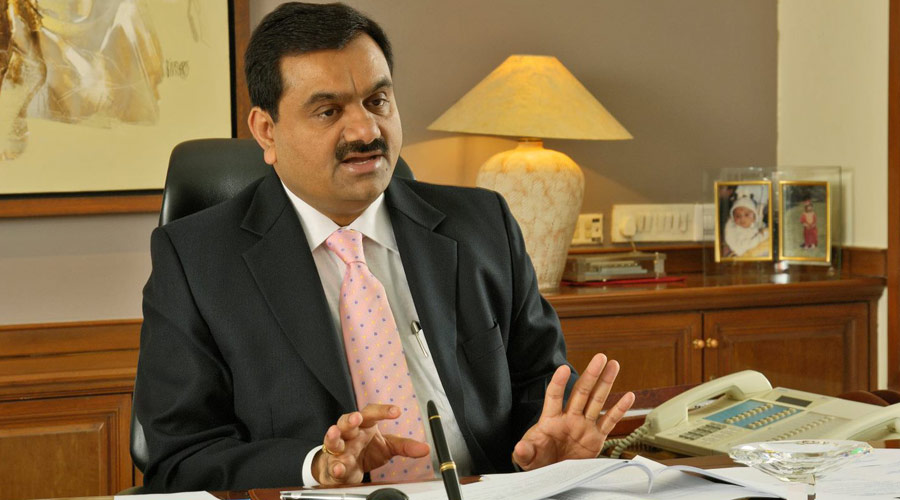For a measly $1 billion, the Adani group has placed the future of Mumbai — the country’s financial capital — at risk of plunging into a state of darkness.
The risks arise from the fierce collateral terms attached to the $1-billion Senior Secured Notes that Adani Electricity Mumbai Ltd (AEML) floated in February 2020 — just 18 months after the Adani group gained control of beleaguered tycoon Anil Ambani’s Reliance Infrastructure Ltd.
Electricity drives an economy: AEML, which claims to supply power to 66 per cent of power consumers in the Maximum City, has put the lifeblood of the country’s financial capital at precipitate risk of severe disruption in the event of a payment default.
The risks of default have magnified considerably since Hindenburg Research came out with a report on January 24 that accused Gautam Adani and his associates of accounting fraud and stock manipulation over the past two years that propelled the Gujarat-based tycoon to dizzying heights on the global wealth charts.
In February 2020, AEML floated the $1-billion Senior Secured Notes which carry a coupon of 3.949 per cent and are listed on the Singapore Stock Exchange.
The terms of the loan covenant are not widely known because AEML is an unlisted company — and that means the city of Mumbai, its financial regulators, financial institutions, banks and market authorities are possibly unaware of the powder keg they might be sitting on.

The uncertainties and risks for Mumbai lurk in the tough conditionalities tied to the $1-billion Notes that were not offered for sale in the US, India or the European Economic Area. They were principally sold to investors in Asia, who could well include investment entities from China that have almost universally been regarded with some dread because of their suspected links to the Chinese government.
Two in every three households in the Maximum City— the moniker author Suketu Mehta coined for the metropolis that is as famous for its grime as glamour — get their power supply from AEML.
The power distributor has a licence to supply power to over 3 million households in an area covering more than 400sqkm that includes the principal suburbs of Mumbai and Thane. “The Company is servicing 85 per cent of Mumbai’s geography, touching 2 out of 3 households in Mumbai, which is India’s commercial capital and most populous city in the country and among the top 10 Global Finance Centers with per capita income at 4x of India,” AEML boasts in a compliance certificate linked to the bond issue that was filed with the Singapore bourse in March 2021.
Pledges and liens
Under the collateral terms of the bond, AEML has pledged the entire equity capital of 4 billion shares and preference capital in the country’s largest private power distributing company, and accepted stiff conditionalities that could have serious repercussions for the Maximum City if it falters on payments.
Characterised as Senior Secured Notes that will mature in 2030, the bond-holders have the first charge on immovable properties of AEML, certain movable assets, all book debts, operating cash flows, receivables, and commission or revenues arising from present and future projects.
There is more: the investors in the Notes also hold the rights to AEML’s transmission and distribution licences, issued by the Maharashtra Electricity Regulatory Commission (MERC).
The private sector was allowed to enter the power transmission business only in 1991 even though a few players like CESC and Tata Power had been involved in generation and distribution for several decades.
Section 17(3) of the Electricity Act, 2003, says: “No licensee shall at any time assign his licence, or transfer his utility, or any part thereof, by sale, lease, exchange or otherwise without the prior approval of the Appropriate Commission.”
In June 2021, the MERC accorded “in-principle approval” for the assignment of the transmission and distribution licence in favour of SBICAP Trustee Co. Ltd, which has been designated as the security trustee and holds all documents related to the bond flotation.
The bond flotation was managed by Madison Pacific Trust Ltd and SBICAP Trustee Company Ltd. Madison Pacific is designated as the Note Trustee.
The question of assigning a licence may arise when a power utility has to deal with certain operational issues or during a merger of power utilities. It is hard to believe that the authorities could have envisaged a situation where the licence could be assigned to a bunch of creditors. The Adanis are probably the first power utility to assign their licence in the manner that they have done; they were able to do so because no fetters or explicit exclusions had been placed on the assignment of the licence.
The 25-year transmission licence is valid till August 15, 2036 — and can be further extended at “minimal cost”, the Adanis claim. The group has also given a non-disposal undertaking (NDU) over the immovable properties of AEML. The Adanis have formed an obligor group to underwrite the commitments to the bond-holders. This group includes AEML and Power Distribution Services Ltd (PDSL), which was incorporated in December 2019 with its registered office at Adani House in Ahmedabad.
AEML and PDSL are subsidiaries of Adani Transmission, and the “ultimate holding entity is S.B. Adani Family Trust (SBAFT)”.
PDSL was established to provide a range of services to AEML, including human resource management, administrative support, information technology support, finance and accounts, audit and assurance support, treasury management, tax advisory, security support and training, other corporate support, business plan advisory, advisory on the implementation of best practices in line with global utility players, and advisory on process improvement.
AEML and PDSL are part of an obligor group committed to honouring the onerous conditions attached to the $1-billion Senior Secured Notes and a $400-million facility agreement.
The arrangers of the bond issue included Barclays Bank PLC, Citibank, N.A., Deutsche Bank AG, Emirates NBD Bank (P.J.S.C.), JPMorgan Chase Bank, N.A., MUFG Bank Ltd, Qatar National Bank (Q.P.S.C.) and Standard Chartered Bank Singapore Limited.
More ominously – and in the light of recent developments where the Adanis are being pressured to beef up stock or margin commitments -- the filing says: “The Collateral shall also include such security interest as may be required to be created by other group entities of the Issuer in the future, and such collateral may be shared in the same manner… with other lenders of the Company, and such future obligors.”
Qatar twist
Before the $1-billion Notes were floated, the Adanis had signed a definitive agreement with Qatar Holding LLC, a wholly owned investment holding company of the Qatar Investment Authority, under which the Qatari firm invested Rs 3,200 crore (approximately $450 million) and picked up a 25.1 per cent stake in AEML along with two board positions.
The $450-million payout included approximately $282 million of shareholder affiliate debt. The proceeds from this subordinate debt were used to repay AEML’s existing senior debt in an attempt to deleverage the company.
The intriguing bit is that the Qatari company also pledged its 25.1 per cent stake in AEML when the electricity utility opted to raise the $1-billion flotation.
The annual report of AEML shows that it will have to pay Rs 2,137.35 crore to Qatar Holding LLC as of March 31 last year on account of the shareholder affiliate debt.
Default backlash
In the event of a debt default, the Note-holders will be at liberty to “sue… or join any legal or arbitration proceedings against any Obligor to recover and present and future liabilities, debts and other obligations at any time due”.
They can also “levy distress against any Obligor’s assets or undertakings or attach, levy execution, arrest or otherwise exercise any creditor’s process in respect of any asset or undertaking of any of them”.
In the annual report for 2021-22, Adani Transmission said: “The 3.949% Bond amounting to Rs 7,364.53 Crore is repayable by way of bullet payment in February 2030 with an obligation to prepay the debt on the occurrence of certain events. The Group can voluntarily prepay the Bond on payment of premium.”
The Adanis have been scrambling to soothe bond-holder concerns after the market value of many of these instruments floundered following the Hindenburg report.
The Adani group has been able to raise around Rs 15,446 crore after US-based equity firm GQG Partners scooped up shares in four companies: Adani Enterprises, Adani Ports & SEZ, Adani Transmission and Adani Green Energy.
Under the deal, the US firm bought 2.84 crore shares (or 2.54 per cent) from the promoters for Rs 1,898 crore. There is no indication that the Adanis intend to exercise the option to pre-pay the $1-billion loan after raising Rs 1,898 crore from GQG Partners. The Adanis have fortified themselves against enforcement action in the event of a default.
While listing the risk factors in the offer document to the flotation, Adani Transmission said: “Any event of default would result in the lenders enforcing their security and taking possession of the underlying assets.”
But it isn’t going to be easy because the mechanism for enforcing action against the Adanis is very elaborate and subject to a so-called inter-creditor deed that places stiff voting requirements graded by the number of days of default.
For instance, during the first 20 business days after the event of default, 75 per cent of the senior secured creditors must vote for the enforcement action with a quorum requirement of 66 per cent. Between 41 and 60 days after default, these requirements go down to 50 per cent and 33.33 per cent, respectively.
In certain circumstances, the Security Trustee (SBICAPS) will have to seek directions from the Note Trustee (Madison Pacific) in the event of default.
But, in the end, this is more than a simple default.
Electricity consumers of Mumbai -– who include businesses that thrum and thrive on the presumption that the transactional pipelines will run without a glitch in a 24x7deal-making environment --have been placed at risk in a manner that could turn their lives upside down for no fault of theirs.
At the very least, companies that go to the market to raise money by issuing securities – and which depend on electricity supply from AEML– will need to tag this as a contingent risk to their operations.
“Uninterrupted power is uninterrupted life,” AEML says in its Singapore exchange filing.
Mumbai has faced such a nightmare in the past. On October 12, 2020, there was a grid collapse that sparked a massive power outage that affected 2,200MW of load in the city. It had taken AEML almost nine hours to restore power supply to the city. It is almost certain that Mumbai’s power consumers will be outraged to learn that they run the risk of a blackout and terrible uncertainty in the event of a payment default.












